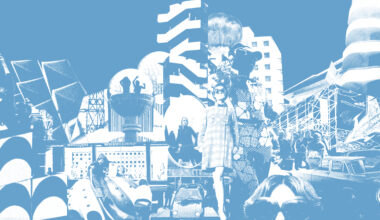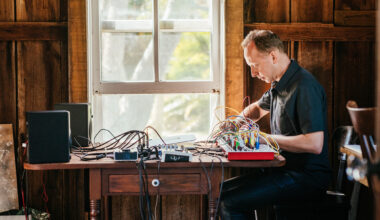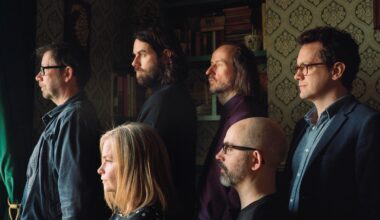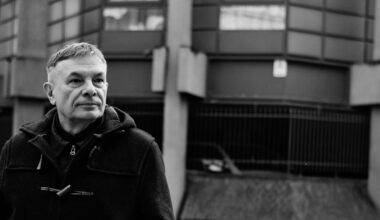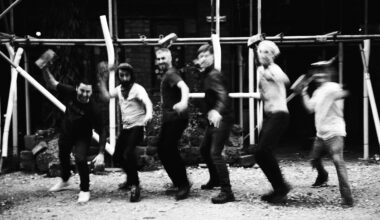From acclaimed prog house DJ to moroccan Gnawa music collaborator would seem a fairly expansive career arc for any musician, but for James Holden it was just the beginning…
“By default, these things want to be in charge,” says James Holden, gesturing at a couple of towers of modular synths in his West London studio. “They want to be dictating the tempo, the tuning, everything. And they’d like you to program what’s going to happen quite precisely.”
It might feel ever so slightly oxymoronic for us to be writing about Holden, a former DJ and now bandleader of James Holden & The Animal Spirits when he appears so critical of technology, but what he’s referring to is a quality inherent to machines that musicians have long tried to overcome with their desire to inject a more “human” quality into valves and circuitry. It’s a challenge that Holden has embraced fully on his third album, ‘The Animal Spirits’, marking a pivotal change in direction towards an electronically-augmented free music, beholden to the spiritual jazz of the 1960s. Little about ‘The Animal Spirits’ was hinted at on his previous albums, beyond a willingness to expand its creator’s own artistic boundaries.
“It’s taken a long time,” he reflects. “I’ve had to learn a lot, but it’s just been a series of steps slowly getting towards what I want to be.”
James Holden got into music quite late. Growing up in a culturally conservative family in Leicestershire, he readily admits that he had big gaps in his musical knowledge. Instead, he found himself mucking around on an early home computer and gravitating toward crafting little 8-bit chiptunes. At high school, his use of the music room’s Atari caught the attention of a young physics teacher who introduced Holden to the broad church of 90s dance music.
“We would spend half an hour chatting at the start of every school day,” recalls Holden. “I’d go and see him, we’d talk about music, he’d give me a tape and I’d go home, study it, copy it, and give it back. Discovering all that after almost no music was really exciting.”
Holden’s physics teacher is just one of a handful of characters in his backstory that have had a major bearing on the exploratory paths that he has since taken. After taking all of that on board and becoming a successful international DJ, like you do, Holden found himself lumped in uncomfortably with the progressive house scene, which led him to set up his own Border Community imprint in 2003.
“It was the start of a gradual breaking free,” he enthuses. “It meant I had more control. We were able to slowly establish our own little scene, just swapping ideas and methods. It felt vibrant and quite naïve, and that helped me want to get loose of lots of baggage.”
It’s important to see James Holden’s three albums in the context of his journey; his 2006 debut, ‘The Idiots Are Winning’ was a diverse record, but it was still relatively rigid, while 2013’s ‘The Inheritors’ couldn’t have been more different, with Holden’s loosening up taking centrestage, edging far beyond dance music’s limiting conventions. Crucially, the album’s signature moment, a jazz-infected epic called ‘The Caterpillar’s Intervention’ featured saxophone by Zombie Zombie’s Etienne Jaumet, who would prove to be yet another figure to have altered Holden’s path for the better.
Another was RocketNumberNine drummer, Tom Page. The tour to accompany ‘The Inheritors’ saw Holden recruit Page to bring his complex studio excursions to life on stage. Both Page and Jaumet are members of The Animal Spirits, along with Woven Entity’s Lascelles Gordon, virtuoso improv musician Liza Bec and multi-instrumentalist Marcus Hamblett.
In 2015, Hamblett had asked Holden to join him and drummer Mark Holub in the BBC’s Maida Vale studio for a now-seminal session on Radio 3’s ‘Late Junction’ show. The recording was inspired by Ornette Coleman’s classic ‘Lonely Woman’. Tackling any Coleman piece is challenging enough for a schooled jazz group; when adding modular synths to Coleman’s trademark harmolodics (his theory for prioritising harmony over melody) it could’ve turn out to be a complete disaster, but it proved to be anything but.
“This was just at the start of the writing process for what became ‘The Animal Spirits’, when I was just starting to build a new synth and I’d worked out the beginnings of the software that I wrote,” he says. “It seemed like a golden opportunity to try it out.” This was one of two formative experiences that year which would have a major bearing on the sound of ‘The Animal Spirits’. Performing with the late Moroccan Gnawa musician, Maalem Mahmoud Guinia was the other, culminating in the ‘Marhaba’ release for Border Community.
“Going to Morocco made me appreciate that electronic instruments are pretty dumb,” he laughs. “In order to not be imperialist culture thieves, when you’re working with Moroccan musicians you’ve got to fit into their band.”
For Holden that meant taking a modular synth with him to the sessions, believing this would give him the means to blend in.
“After the first meeting I thought to myself, ‘Oh fuck, I’ve got this entirely wrong’ and I stayed up all night trying different things to make an instrument that I could actually play, just like they were playing.”

The final ingredients for ‘The Animal Spirits’ came from Holden’s own appetite to explore anything other than the electronic music he’d played as a DJ.
“When you’re a DJ you’ve got to listen to all the new music, even if you’re trying to play as little straight dance music as possible and get away with it,” he sighs. “For months after I stopped DJing, I couldn’t listen to anything with a programmed drum machine, but I also suddenly had time to stick with something and really listen to it. It was Pharaoh Sanders and Don Cherry, especially their Organic Music Society stuff that I found most interesting.”
The signature moment on ‘The Animal Spirits’ is ‘Pass Through The Fire’. The track begins with a simple keyboard pattern before other instruments climb aboard and coalesce into a noisy, vibrant dynamic. It nods to the transcendent trance music Holden experienced in Morocco, but also embraces the concept of spiritual jazz espoused by John Coltrane, Sanders, Cherry and many other post-bop musicians in the 60s. The track also acts as a convenient allegory for Holden’s entire career, beginning in relatively naïve territory before becoming infinitely more complicated.
Even though his personal involvement on a track like ‘Pass Through The Fire’ might occasionally be subsumed beneath the layers of sound each player adds, taking the role of bandleader meant that Holden was actively making decisions over how each piece should sound, without stifling the conversation between the players as they improvised around his instructions.
“The chords for the horn players on ‘The Beginning & End Of The World’ have a rotational symmetry, in fourfold,” says Holden, making hand gestures suggesting the rotation of a cube. “On that track the melody goes around one-and-a-bit times, and then it’s a round between the pair of them as well, which means it’s quite hard to stay on top of it when you’re playing. I had to write scores for that, and they’re long as fuck.
“In general, I don’t really believe in pinning things down too much, and the same goes for the computer. Normally when people approach electronic music, it’s using a programmed, fixed sequence. As people start to use modulars I see them freaking with the sequence as it runs, and I like that when other people do it. This whole album was about taking that idea as far as I could using my limited technical abilities.”
Holden is more than a little modest when he talks about his technical prowess. His approach has a scientific quality, a need to get inside the process of how sound is formed, borne from both natural inquisitiveness and the sharp mind that found him studying mathematics at Oxford. It’s those driving forces that led him to program his own software and design his own modular synth to be small enough to fit into an airline carry-on and yet be flexible enough to “skronk like a saxophone”.
“Rather than programming in exactly what notes can happen when, you tell it what the chords of the song are, the sort of rhythm it has, the overall melodic shape, and then you let it go.”
He glances at the screen of a laptop containing what looks like a bunch of market charts, but which are in fact the visual forms of the controls.
“It came from watching the Gnawa musicians play. When someone was playing the bass riffs that were the backbone of their songs, it was a repeating pattern, but one that never actually repeated. I started to think that the computer has to be able to do a bit of that for me, as I’ve only got two hands. That’s the only possible way that this music could be a conversation, and for me to be a part of that conversation.
“Figuring that out came through another of those lucky encounters. I read about the work of a Harvard physicist who had used maths to prove human timing. He measured a person playing on their own and their deviations from a metronome, and then two people playing a duet. He proved that everything you do in a duet affects everything I do, and vice versa, and it ripples continually, meaning a mistake in the first beat is still affecting the last one. He explained the research and the maths to me, and I implemented that algorithm.”
In practical terms, it means that Tom Page’s drum kit is wired into the computer, which follows his timing, creating a duet with all its scientifically-proven errors and ripples.
“Timing isn’t the only bit of music where there’s a communication going on,” counsels Holden. “There’s also the concept of a musician fitting into the gaps: Etienne hears space in my cloud of notes for his line, and then I get to answer that by making more space for it. That can only be done in the moment to make all of those elements come together.”
Where James Holden is headed, or where he might end up, is unclear, least of all to him.
“It all depends on what fate puts in my path,” he reflects. “I don’t know who I might meet or what I might learn, but I know that what I can do with this set-up and this mindset, and these people makes it feel like it’s just the beginning.”
He sits back in his chair, surrounded by uniquely-configured technology and the keys to unlocking any number of ideas in conjunction with his band of diverse and prodigious talent.
“When you’re looking for these trance musics across the world’s musical history, you see that these people can’t physically have met, and yet they’ve somehow invented exactly the same type of thing,” he muses.
“We’re all just pushing the same buttons on the same machines in our heads.”
‘The Animal Spirits’ is out on Border Community

